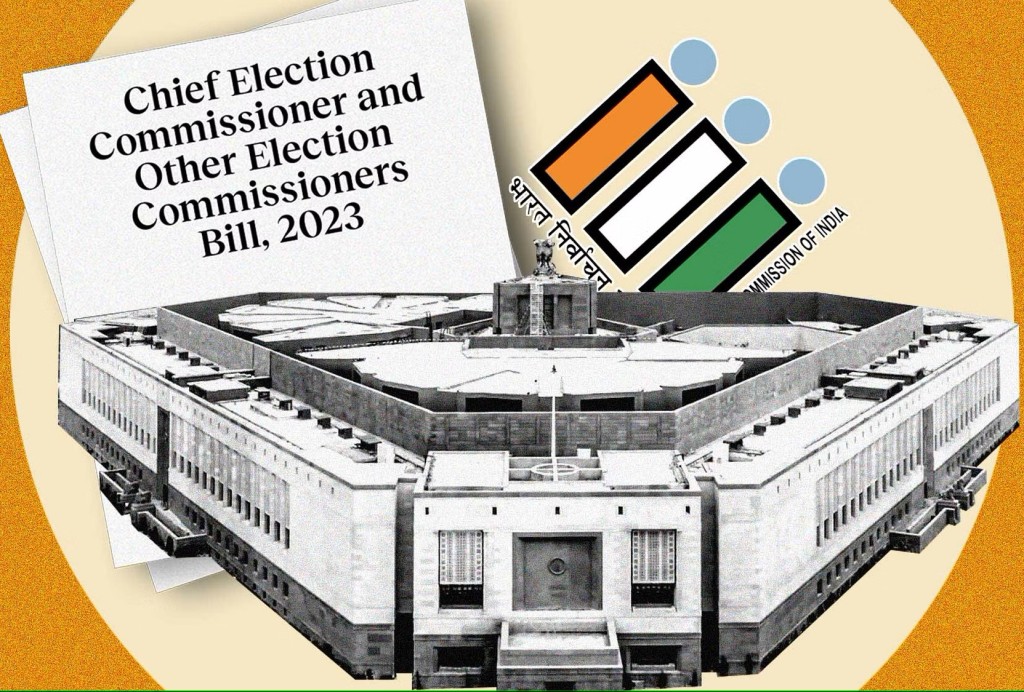The Chief Election Commissioner Bill: A Classic Case of a Constitutional Hardball
- Masoom Sanyal
- Oct 20, 2023
- 4 min read
Updated: Mar 30, 2025

Introduction
The Chief Election Commissioner and Other Election Commissioners (Appointment, Conditions of Service and Term of Office) Bill, 2023, was introduced in the Indian Parliament during its Monsoon Session. This Bill seeks to create a Selection Committee for recommending appointment of the Chief Election Commissioner and other Election Commissioners. This Selection Committee will be chaired by the Prime Minister and will consist of two members, namely, the Leader of the Opposition and a Union Cabinet Minister nominated by the Prime Minister. The Bill seeks to replace the Selection Committee consisting of the Prime Minister, the Leader of the Opposition, and the Chief Justice of India, as established by the Supreme Court’s verdict in Anoop Baranwal v. Union of India. In this article, I argue that the Chief Election Commissioner Bill, although consistent with the constitutional provisions on the face of it, is a classic example of what Mark Tushnet calls a ‘constitutional hardball’.
What is a ‘Constitutional Hardball’?
The concept of a ‘constitutional hardball’ was first developed by Professor Mark Tushnet of Harvard Law School in an article by the same name, published in 2004. In the words of Professor Tushnet, “[constitutional hardball] consists of political claims and practices – legislative and executive initiatives – that are without much question within the bounds of existing constitutional doctrine and practice but that are nonetheless in some tension with existing pre-constitutional understandings.” In other words, any legislative or executive action that is on the face of it constitutional but does not sit right with a pre-existing understanding of the Constitution can be called a ‘constitutional hardball’.
According to Professor Tushnet, constitutional hardballs are employed more frequently during a time of ‘constitutional transformation’ whereby, he says, constitutional understandings that were otherwise taken for granted are brought into question and a new constitutional order is sought to be ushered in. It can be argued that India is in an era of ‘constitutional transformation,’ whereby existing constitutional understandings are being questioned and challenged. The recent attacks on the legitimacy of the Basic Structure Doctrine by a member of Rajya Sabha belonging to the ruling party and by a constitutional functionary no less than the Vice President provide a stark illustration of the attempts to call into question existing constitutional understandings. But even if we are to ignore this backdrop, the concept of a ‘constitutional hardball’ is capable of being understood independent of the existence of an era of ‘constitutional transformation.’
An Analysis of the Chief Election Commissioner Bill and Relevant Constitutional Provisions
The object of the Bill is to regulate the appointment, conditions of service and term of office of the Chief Election Commissioner and other Election Commissioners. Clause 7(1) of the Bill provides for a Selection Committee, on whose recommendation the President will appoint the CEC and other ECs. The clause provides that the Committee shall consist of the following: (a) the Prime Minister, as the Chairperson; (b) the Leader of the Opposition in the House of the People, as member; and (c) a Union Cabinet Minister nominated by the Prime Minister, as member. The Section clarifies that in the absence of a Leader of Opposition in the House of the People, the leader of the single largest opposition party in the House will be the member. However, sub-clause (2) of clause 7 is more alarming. It provides that the appointment of the CEC or the ECs shall not be invalid due to any vacancy or any defect in the constitution of the Selection Committee.
Does this mean that in case the Leader of Opposition is not present, for whatever reason, the Prime Minister and a Union Cabinet Minister can jointly recommend a person who will then be appointed as the CEC or an EC? On the face of it, this seems to be the most natural – and naturally dangerous – reading of Clause 7(2) of the Bill.
This provision singlehandedly poses a great threat to the independence of the Election Commission of India. Some commentators have likened it to the Umpire being appointed by the Players. Questions have been raised about the independence of the Election Commission being compromised due to the nature of the Selection Committee as well as the other provisions of the Bill regarding the service conditions and tenure of the Commissioners.
I call this Bill a ‘constitutional hardball’ because it is, on the face of it, constitutionally valid. There are two main reasons which raise the presumption of its constitutional validity and make the prospect of it being struck down as unconstitutional dim: firstly, Articles 324(2) and 324(5) vest in Parliament the power to make such a law, and secondly, the Supreme Court’s decision in Anoop Baranwal categorically laid down that the Selection Committee consisting of Prime Minister, Leader of Opposition, and the CJI will hold field only until a law in that regard is made by the Parliament. Therefore, the Supreme Court itself left open the possibility of a law – good or bad – being made in this regard by the Parliament.
Conclusion
This Bill is an appropriate example of a ‘constitutional hardball’ since, for reasons indicated above, it is outwardly constitutional. However, it is in deep tension with the pre-existing understanding of the Constitution. A liberal democratic constitution could never envisage that the appointment of the CEC and other ECs be made on the recommendation of a committee such as the one proposed in this Bill. Nothing would endanger the independence of the Election Commission and the probability of free and fair election – two essential hallmarks of a functional democracy – more than such a provision. The Bill may, therefore, comply with the text of the Constitution, but it grossly violates the spirit of the Constitution – but that is exactly what a ‘constitutional hardball’ is supposed to do.
